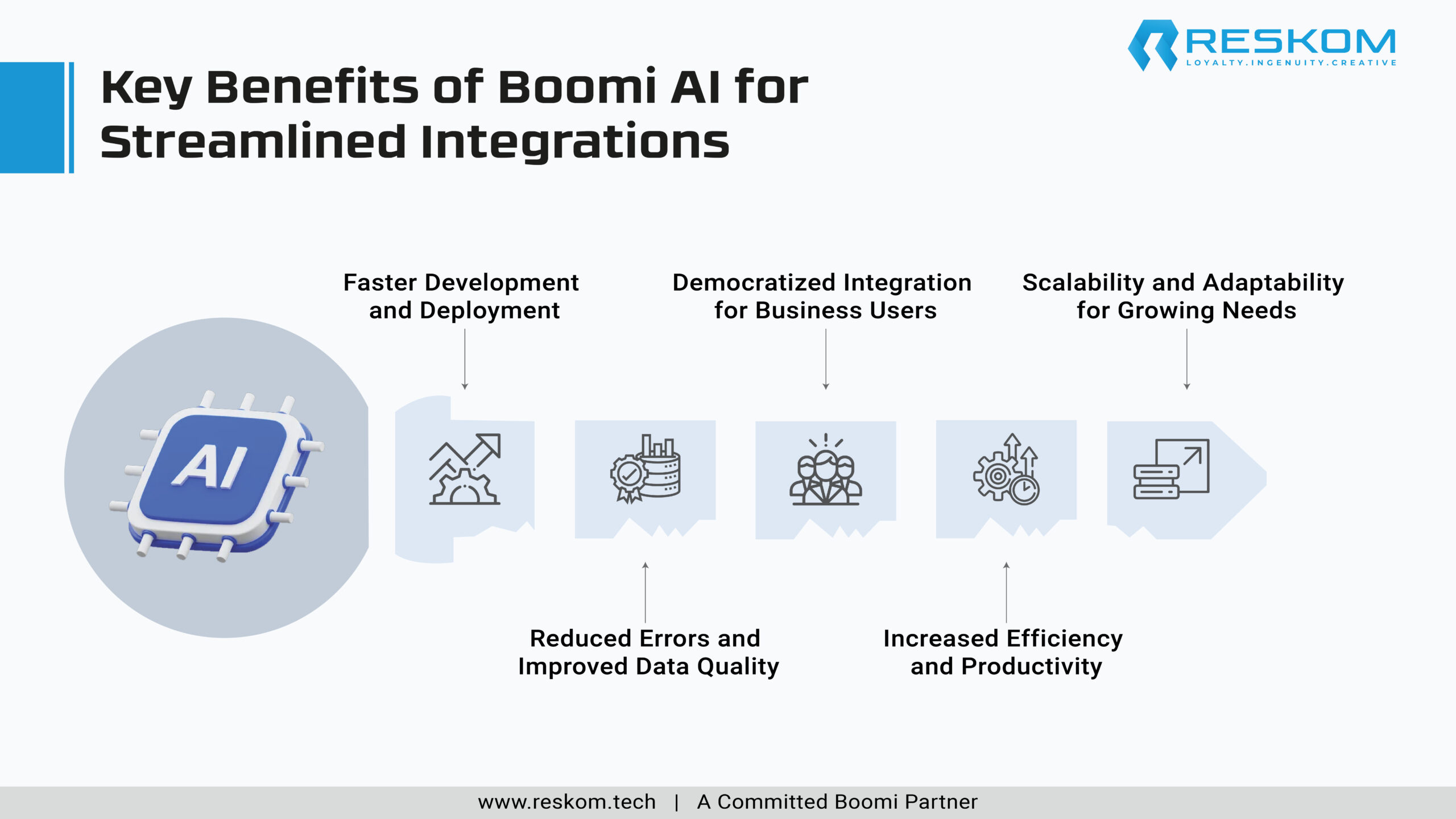From customer relationship management (CRM) software to enterprise resource planning (ERP) systems, these applications hold valuable information that needs to flow seamlessly for optimal efficiency. However, integrating these disparate systems can be a time-consuming and error-prone manual process.
According to a recent IDC report, global data creation is expected to grow to 175 zettabytes by 2025. Integrating this data efficiently is crucial for companies to remain competitive. This is where Boomi’s AI capabilities come into play, streamlining integration processes and making data management simpler and more effective offering a smarter and more streamlined approach to integration.

AI Revolutionizes Integration: From Manual to Intelligent
Traditionally, application integration involved manual coding and configuration, requiring specialized skills and significant resources. This approach is often slow, inflexible, and prone to human error. Boomi’s AI features transform this process by automating tasks, suggesting best practices, and even generating integrations based on natural language instructions.
Before diving into the specifics of Boomi’s AI capabilities, it’s essential to understand why data integration is so important. Businesses today operate on numerous platforms—CRM systems, ERP systems, social media, and more. Each of these platforms generates valuable data, but when this data is siloed, it becomes less useful. Integration ensures that data from all these sources can be combined, analyzed, and used effectively.
Traditional integration methods often involve manual coding and are time-consuming and error-prone. As businesses scale, the complexity and volume of data make manual integration increasingly impractical. This is where intelligent automation, powered by AI, becomes a game-changer.
Boomi's AI-Powered Features for Integration
Boomi, a leading Integration Platform as a Service (iPaaS) provider, leverages AI to automate and streamline integration processes. Here are some of the key AI-powered features that Boomi offers:
- Intelligent Integration Suggestions: Boomi’s AI-driven platform provides intelligent integration suggestions by analyzing and optimizing existing integrations, saving time and enhancing efficiency with minimal human intervention.
- Automated Data Mapping: Data mapping, traditionally a manual and tedious process of matching data fields between systems, is streamlined by Boomi’s AI, which intelligently automates the identification of best matches, saving time and reducing errors.
- Error Detection and Resolution: Boomi’s AI-driven error detection continuously monitors for anomalies, alerts users, and suggests solutions to ensure smooth integrations and minimize downtime.
- Predictive Analytics for Integration Health: Boomi’s AI-driven predictive analytics use historical data to forecast integration performance, helping businesses preemptively address issues and maintain smooth operations.
Benefits of Boomi AI for Streamlined Integrations
Boomi’s AI brings numerous benefits to data integration, making processes faster and more accurate. By automating tasks and predicting potential issues, Boomi ensures seamless data flow, reduces costs, and enhances operational efficiency for businesses of all sizes.
- Faster Development and Deployment: Boomi AI features, such as Quick Start and Suggest, streamline integration by reducing development time and providing real-time recommendations, allowing businesses to focus on strategic initiatives.
- Reduced Errors and Improved Data Quality: Boomi AI reduces integration risks by automating error handling, data validation, and data transformation, ensuring consistent and reliable data flow across applications.
- Democratized Integration for Business Users: Boomi’s conversational AI, Boomi GPT, enables non-technical business users to describe integration objectives in plain language, empowering them to collaborate and engage in the integration process.
- Increased Efficiency and Productivity: Boomi AI automates tasks, like data mapping and error correction, freeing IT staff for complex projects, and speeding up integration.
- Scalability and Adaptability for Growing Needs: Boomi’s AI adapts to changing business needs, automatically scaling to handle growing data volumes and ensuring efficient integrations.
Use Cases of Boomi AI Streamlining Integrations Across The Industries
Here are some examples of how companies have leveraged Boomi AI to streamline their integration processes:
- A manufacturing company can use Boomi Quick Start to connect its CRM system with its production line data, enabling real-time tracking of inventory levels and production status. This improved production planning and reduced lead times.
- A retail chain has an advantage in employing Boomi Suggest to optimize data mapping between their point-of-sale (POS) system and their loyalty program. This will ensure better data accuracy and lead to a more personalized customer experience.
- A healthcare provider can leverage Boomi GPT to automate basic integrations between their electronic health records (EHR) system and various patient portals. This streamlined data exchange and improved patient care coordination.
These are only a few instances; the possibilities are many. By leveraging Boomi’s AI capabilities, businesses can significantly streamline their integration processes, improve data quality and accuracy, and ultimately achieve greater operational efficiency and agility.
Considering Boomi for Your Integration Needs?
RESKOM, as a trusted Boomi cloud solutions provider, can help you implement and leverage Boomi’s AI functionalities to streamline your integration efforts. We offer expert guidance, support, and training to ensure you get the most out of your Boomi investment.
Boomi’s AI capabilities revolutionize the way businesses approach data integration. By automating complex processes and providing intelligent insights, Boomi simplifies integration, reduces costs, and improves data accuracy. At RESKOM, we leverage Boomi to deliver superior cloud solutions that help businesses streamline their operations and achieve their goals.


